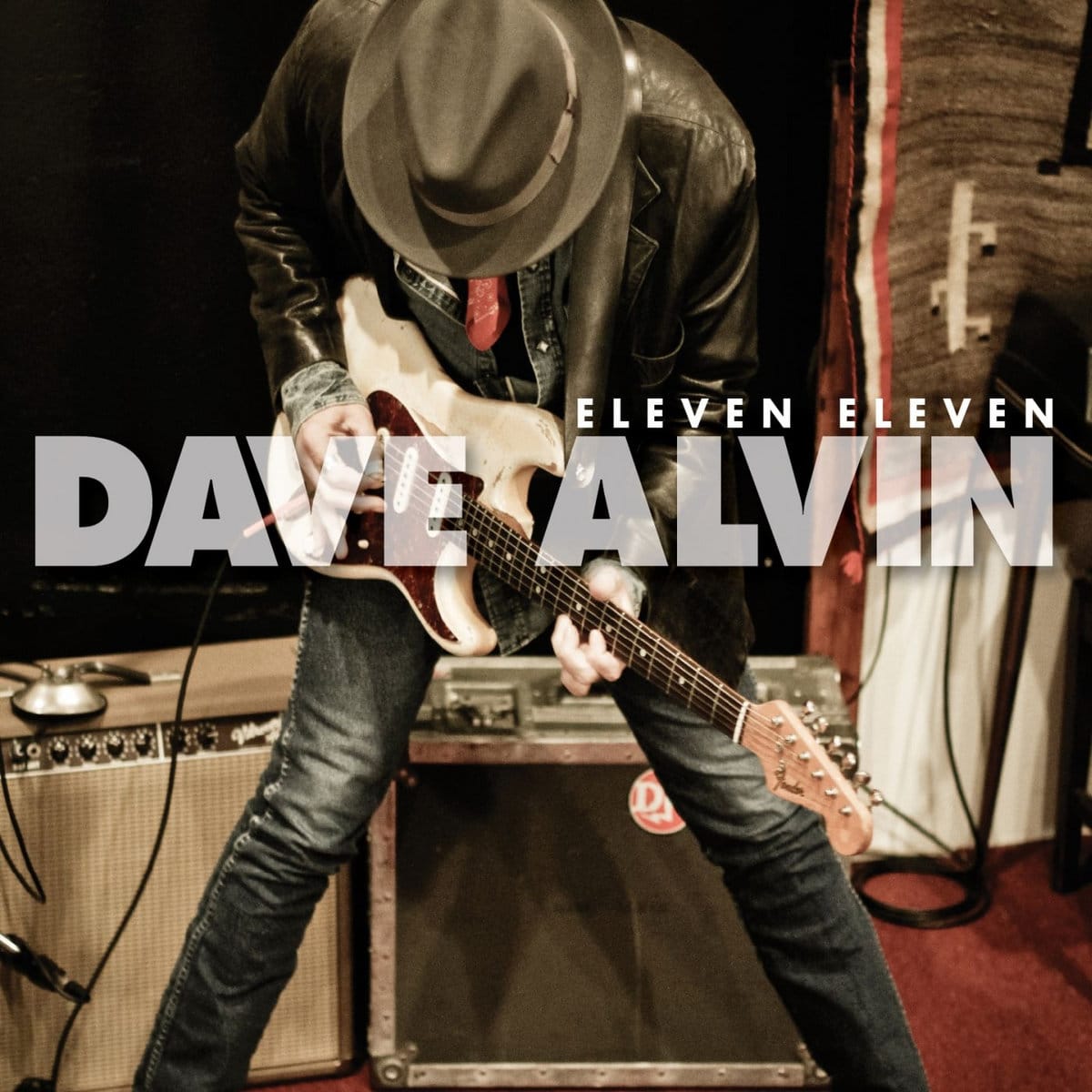Eleven Eleven is Dave Alvin at his razor-edged, two-fisted best, in control, surgical, and poetic, a rock n’ roll professor with barbed wire credentials. A melange of melancholy and charred tone, the Blaster/X’r/Knitter/Flesh Eater/Pleasure Baron/American music icon’s eleventh solo effort traverses blood and history, uncoiling to strike with fanged, to-the-bone cool.
Altering the mood forever after, album opener “Harlan County Line” has all the snarl of a panther, a still-warm memory cutting through last night’s reverb and this morning’s menthol smoke, teasing the build and recounting the cinematic tale of a blue Kentucky lover long gone from Alvin’s arms but not his head. Featured in season two of the excellent series Justified, “Harlan County Line” is a highlight not only of Eleven Eleven but of Alvin’s career at large.
“Johnny Ace Is Dead” is as good as it gets, a tragic true tale of the late blues singer and pianist who accidentally shot himself on Christmas day 1954 at the young age of twenty-five. Full-tilt and unashamed, Alvin and his perfect band deliver the events as expert witnesses, barely containing a macabre fascination behind a riff and rhythm as mean and calculating as Don Robey’s scorpion-tailed savvy.
In 2009, Dave Alvin formed the Guilty Women (a gender flip of his regular outfit), an all-star band that featured fiddler Amy Farris, the subject of the eulogistic “Black Rose Of Texas” who died of an apparent suicide the same year. It’s an emotional understanding of one artist by another, bruising and still tender to the touch.
Dave’s father Cass left Indiana for California during the Depression, initially finding work in the steel mills before ultimately becoming a labor union organizer. “Gary, Indiana 1959” is Alvin’s tribute to that legacy as well as the United Steelworkers strike that occurred during the titular year. It’s pride worn to faded glory laced with a ragged optimism that as the struggle continues, so will the resolve of those willing to fight. Elsewhere, Phil Alvin, a different variety of instigator, joins his younger sibling and fellow Blaster for the fiery and parodic family romp “What’s Up With Your Brother”. Both songs tumble forward with gleeful intent showcasing Dave’s undeniable admiration for both elder Alvins while maintaining his own power and mystique.

Alvin & company excel on “Murrieta’s Head”, a pulsing hell ride steeped in the myth of Joaquin Murrieta, a Robin Hood-like miner turned outlaw who may or may not have existed in the 1850s. Amid a cavalry of backbeats, Alvin assumes the mantle of a conflicted California Ranger tasked with hunting down the legendary bandit, delivering the gooseflesh-inducing Peckinpah-ish tale in sun-chapped, dusty leather tones.
For the wistful “Manzanita”, Guilty Woman Christy McWilson shares the pen and vocals on a duet between two unique voices that stir nostalgia while evoking memories as textured and enduring as mountain driftwood before Alvin shreds the script, provoking carnality and lusty, funky groove out of “Dirty Night Gown”.
“Run Conejo Run” is a Bo Diddley Beat-backed biography of Golden Gloves boxer, singer-songwriter, and multi-instrumentalist Chris Gaffney– Dave’s friend and Guilty Man bandmate who succumbed to liver cancer in 2008. Stained and unconditional, the tune is among several instances where Chris’s spirit figures into Eleven Eleven’s narrative. The Gaffney-penned “No Worries Mija” finds Alvin as a gray wolf sweetly growling desperate promises he knows he may not keep over low-plucked guitar strings and hopeful accordion while later, the pals offer up their best Bob and Bing on the sentimental jaunt “Two Lucky Bums”, Gaffney’s’s final studio performance intended for a full album of duets but fated to find its place as Eleven Eleven’s big finish.
This year marks Dave Alvin’s eleventh album’s eleventh anniversary and to celebrate, Yep Roc is doing a double LP reissue (on 11/11), expanding the album to include three songs that didn’t originally make the final sequence (but nevertheless could’ve)– the shuffling and rakish “Beautiful City ‘Cross The River”, back alley blues-er “Signal Hill”, and the second coming of Muddy and Koko duet “Never Trust A Woman” with the late Candye Kane.
I pre-ordered the vinyl months ago and was thrilled to discover the immediately available digital version was Yep Roc’s 2012 deluxe edition including not only the three new songs but also nine live cuts (“mistakes, sweat and all” wrote Alvin) recorded with The Guilty Ones blasting through album selections, favorites (“Long White Cadillac”, “Fourth Of July”, “Rio Grande”, “Out Of Control”), and “Boss Of The Blues”, Dave’s ode to LA’s Central Avenue and his “other father” Big Joe Turner.
As it was when it was released in 2011, Eleven Eleven is equal parts a tribute to fallen friends, a folk document, and a handbook to Dave Alvin’s many influences familial and sonic. I don’t think it’s aged a day and in fact, I’d say it’s even more “relevant”– should such a notion retain any meaning. If honesty and credibility in American music were ever virtues (and I believe as much), Dave Alvin is a paragon and Eleven Eleven the testament.
